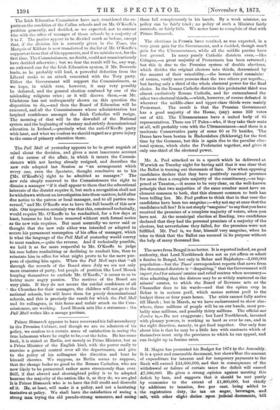The Pall Mall of yesterday appears to be in great
anguish of -mind about the decision, and gives a most inaccurate account of the course of the affair, in which it taunts the Commis- sioners with not having already resigned, and describes the new rule adopted last Session as "an arrangement which every one, even the Spectator, thought conclusive as to his [Mr. O'Keeffe's] right to be admitted as manager." The new rule simply reserved to the Commissioners the right to dismiss a manager "if it shall appear to them that the educational interests of the district require it, but such a recognition shall not bewithdravrn without an investigation into these matters, held after due notice to the patron or local manager, and to all parties con- cerned," and Mr. O'Keeffe was to have the full benefit of this new rule. Our impression certainly was that this, construed technically, would require Mr. O'Keeffe to be readmitted, for a few days at least, because he had been removed without such formal notice as the new rule requires. But most assuredly we never said or thought that the new rule either was intended or adapted to secure his permanent resumption of his offite of manager, which is what the language of the Pall Mall of yesterday would convey to most readers,—quite the reverse. And if technically possible, we hold it as far more respectful to Mr. O'Keeffe to judge his case before readmitting or declining to readmit him, than to reinstate him in office for what might prove to be the mere pur- pose of ejecting him again. When the Pall Mall says that "all through the records of the Board since July we see not only mere creatures of party, but people of position like Lord llonck busying themselves to exclude Mr. O'Keeffe," it seems to us to betray mere angry passion. The motives of the Board are very plain. If they do not secure the cordial confidence of all ' the Churches for their managers, the children will not go to the national schools, but will leave them for purely denominational schools, and this is precisely the result for which the Pall Mall and its colleagues, in this fierce and unfair attack on the Com- missioners, are working. Lord Monck acts like a statesman ; the Pall Mall writes like a savage partisan.


































 Previous page
Previous page